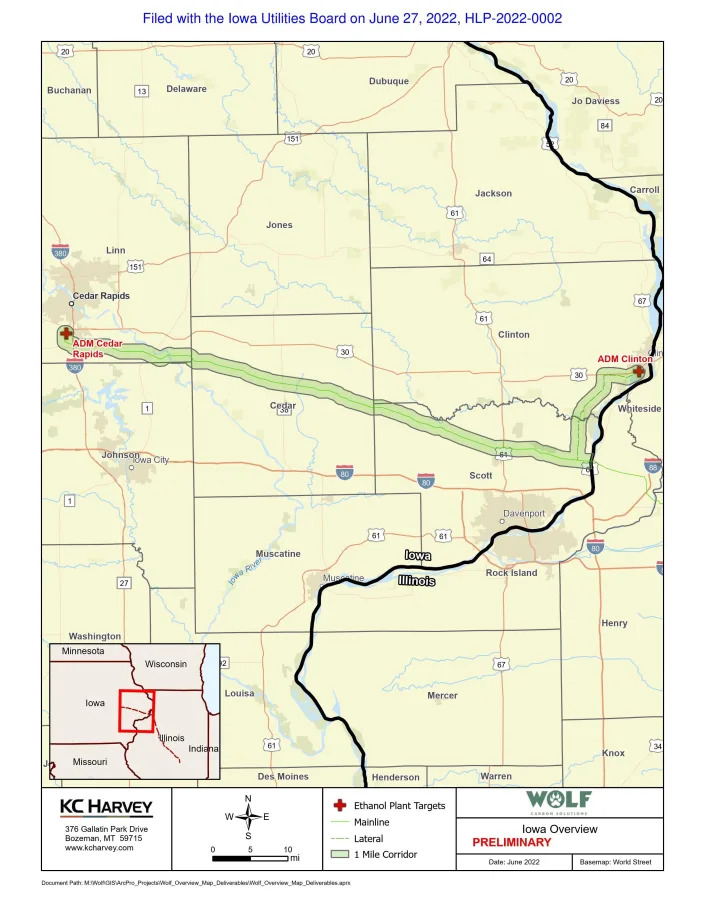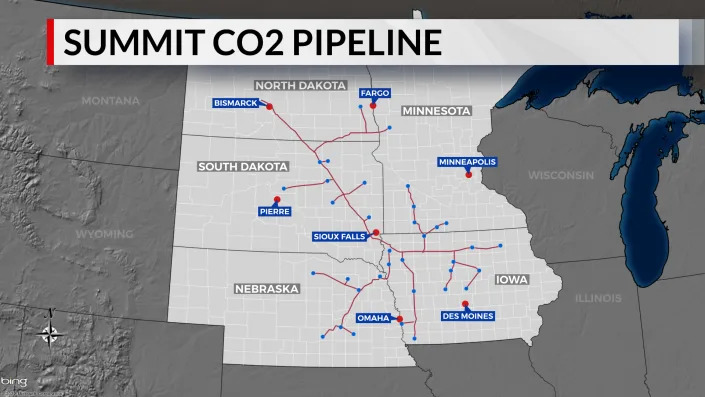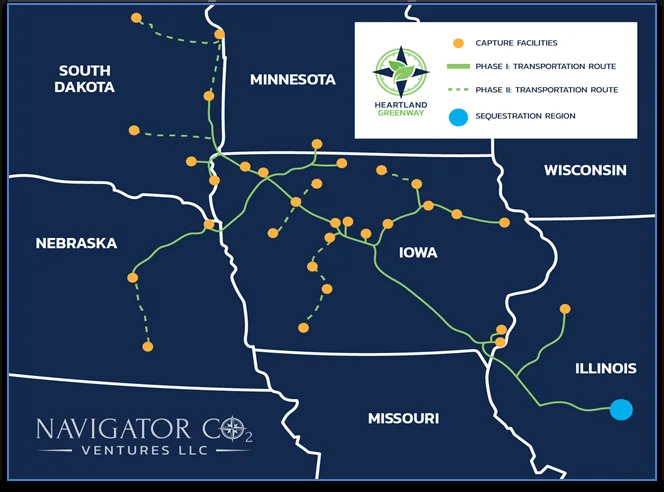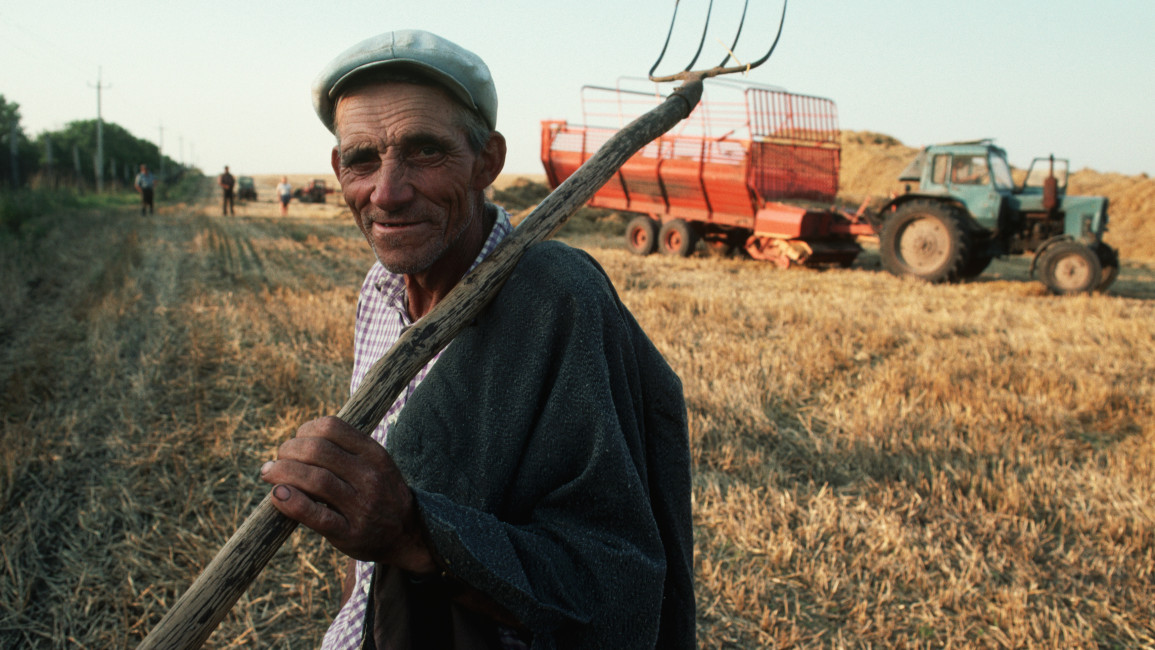George Shillcock, Iowa City Press-Citizen
Thu, July 7, 2022
A sliver of northeastern Johnson County is included in the latest proposal for a carbon capture pipeline in Iowa after two much larger projects completely avoided the area.
A map of a proposed pipeline filed with the Iowa Utilities Board shows the main artery of the 350-mile project would extend from an Archer Daniels Midland Co. location in Cedar Rapids, cutting southeast through Johnson, Linn, Cedar, Clinton and Scott counties. A second lateral line would run north from Davenport to another ADM location in Clinton.
Wolf Carbon Solutions, based in Denver, is partnering with ADM on the proposed pipeline. The company announced in January that it intended to build a pipeline in Iowa. A news release from the companies said the pipeline will transport carbon dioxide from ADM’s ethanol and cogeneration facilities in Clinton and Cedar Rapids to be stored permanently underground at ADM’s already-operational sequestration site in Decatur, Illinois.
While the main line wouldn't go directly through Johnson County, the proposed route's 2-mile corridor does include the northeastern part of the county. Other pipeline proposals in Iowa have avoided running through Johnson County, where opposition is expected.
"This is an exciting opportunity for ADM to connect some of our largest processing facilities with our carbon capture capabilities, advancing our work to significantly reduce our CO2 emissions while delivering sustainable solutions for our customers," ADM president of carbohydrate solutions Chris Cuddy said in the release. "These efforts are core to our purpose, our culture and our growth, and we look forward to working with Wolf Carbon Solutions to finalize this agreement and further decarbonize our operations and our industry.”
Nick Noppinger at Wolf Carbon Solutions told the Press-Citizen in an email statement that the company's goal is to reach voluntary agreements through respectful and open discussions with all landowners along this proposed route. He said the proposed 2-mile corridor, with one mile on each side of a proposed center line, would enable them to cooperatively work with landowners to determine the best possible route.
“Wolf Carbon Solutions is committed to building and maintaining meaningful relationships with landowners," Noppinger said.

The proposed 350-mile carbon capture pipeline from Wolf Carbon Solutions US, LLC
This pipeline is one of several proposed in the Midwest that would run through Iowa, drawing criticism from environmental groups and landowners amid fears that eminent domain will be used to take property for the construction of pipelines.
Other critics argue the pipelines don't do enough to lower carbon emissions and say Iowa should focus on transitioning the state's farming economy away from producing renewable fuel, and the corn and soybean crops needed to make it.
Three companies — Summit Carbon Solutions, Navigator CO2 Ventures and ADM-Wolf — want to build pipelines that run through Iowa that will be used to move carbon dioxide captured from ethanol, fertilizer and other agricultural industrial plants.
The Johnson County Board of Supervisors and other county governments and elected officials and also signaled strong opposition to these projects.
More: What we know about three carbon capture pipelines proposed in Iowa
Company claims to push for carbon-neutrality, but critics questions eminent domain tactics and environmental impact
The 350-mile pipeline would include both a main line running west to east from Cedar Rapids into Illinois, and a lateral line running south to north from just north of Davenport to Clinton.
The company would use pressure to liquefy the carbon dioxide, and the pipelines would transport it and then inject it deep underground where it will be permanently sequestered. Summit Carbon plans to sequester carbon in North Dakota; Navigator CO2 and Wolf-ADM plan to do so in Illinois.
ADM and Wolf expect to transport 12 million tons of carbon dioxide a year.
The news release from Wolf-ADM states that ADM’s carbon capture and sequestration capabilities in Decatur have allowed it to safely and permanently store more than 3.5 million metric tons of carbon dioxide 1½ miles underground and have paved the way for increased decarbonization of the company’s operations. The company announced plans to construct a zero-emissions power plant adjacent to the company’s Decatur corn complex, and wants to achieve the wheat milling industry’s first carbon-neutral footprint.

This map, based on information in March 2022, shows the proposed route of the 2,000-mile Summit Carbon Solutions CO2 pipeline that will carry pressurized carbon dioxide from ethanol plants to a sequestration site a mile underground in central North Dakota. About 470 miles of the pipeline would be located in South Dakota.
The release said the pipeline would have significant spare capacity to serve other third-party customers looking to decarbonize across the Midwest and Ohio River Valley.
To build the pipeline, Wolf-ADM will either have to purchase land from many private property owners along the 350-mile route or acquire permission from the Iowa Utilities Board and county governments to use eminent domain to acquire the land, regardless or the support of private landowners.
While landowners can refuse to voluntarily give up their land for this type of project, Summit, Navigator and ADM-Wolf can ask the three-person Iowa Utilities Board to grant eminent domain powers if they're determined to serve a public purpose. That would force unwilling landowners to grant easements at fair market values.
Eminent domain is a power a government entity or its agent can use to take private property for public use while compensating landowners. In this case, if the board grants eminent domain powers, it would force unwilling landowners to sell ADM-Wolf the rights to build across their property.
The Des Moines Register reported that several experts are skeptical of the environmental impact of these pipelines, despite the White House saying that carbon sequestration projects likely will be needed to meet President Joe Biden's climate goal of net-zero emissions economywide by 2050.
The proposals have drawn bipartisan ire from politicians and became an issue prior to the primary elections, including for four of the six Republicans who ran for a Iowa House of Representatives seat, and others throughout the state. As recently as March, a large group of people opposing a pipeline project gathered in the Iowa Capitol.
Wolf-ADM is asking for several informational meetings to take place in September. The company could bypass the need to use eminent domain by reaching out to landowners along the proposed route and attempting to negotiate easements.
More: Iowa official asks Summit Carbon Solutions for more information about possible pipeline leaks, dangers
Johnson County Supervisors express opposition to carbon capture pipelines
The Johnson County Board of Supervisors has already taken a strong stance against carbon capture pipelines, months before any route was officially proposed to run through the county.
The board sent two letters opposing the other two pipeline projects using eminent domain, even though they would not run through Johnson County.
On Wednesday, Supervisor Jon Green told the board about the Wolf-ADM project and said he would like to see the Supervisors send an additional letter stating the county's opposition. The rest of the board signaled its support for an additional letter.
Green, in April, speculated that such a pipeline would eventually make its way to Johnson County and suggested the board should put its "finger on the scale." The other Supervisors agreed and the letter was sent.
When The Cedar Rapids Gazette first reported about this proposed pipeline Tuesday, Green tweeted his opposition to it running through Johnson County.
Michael Daly, a resident of Cedar Township in Johnson County, said at the April meeting that a potential pipeline could cut into his land. It is unclear if this proposal would
"My interest now is more urgent to find some solution," he said. "About the only thing we can do is object."
Supervisor Lisa Green-Douglass said in April that eminent domain should be used for "the greater good and not for private enterprise or private profit, which is what this would be."

The latest version of Navigator Co.'s proposed Heartland Greenway carbon capture pipeline.
The Linn County Supervisors also signed a letter in January opposing using eminent domain for pipelines.
Johnson County Board of Supervisors Executive Director Mike Hensch said in April that he wanted to remind the public that, even if eminent domain is exercised, objections from landowners will go to a county compensation commissions. Hensch is a member of the compensation commission and said he was not taking a position on the issue.
"Each county, in the compensation commissions, can refuse the amount of money that is being recommended. And the step beyond that is district court. We're years away," he said.
More: Advocacy group estimates carbon capture pipelines crossing Iowa will get $23 billion at public expense
Wolf-ADM requests public meetings in September
ADM-Wolf is proposing five public informational meetings in the counties that the pipeline would go through, and a sixth that would be virtual.
"Wolf is committed to transparent, two-way communication throughout this process and is enthusiastic about bringing the economic and environmental benefits of this carbon capture and storage project to Iowa," its letter read.
The letter said that once dates are confirmed, the company will make reservations for suitable locations in each county. Each location will have Wi-Fi capabilities and will be ADA-compliant.
More: Tech giants like renewable energy, but question cost of MidAmerican's $3.9 billion wind, solar plan
George Shillcock is the Press-Citizen's local government and development reporter covering Iowa City and Johnson County. He can be reached at (515) 350-6307, GShillcock@press-citizen.com and on Twitter @ShillcockGeorge
This article originally appeared on Iowa City Press-Citizen: Where a carbon capture pipeline could run through Johnson County







